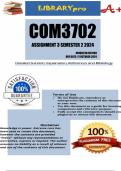COM3702
ASSIGNMENT 3 SEMESTER 2 2024
UNIQUE NO.857988
DUE DATE: 21 OCTOBER 2024
, COM3702
Assignment 3 Semester 2 2024
Unique Number: 857988
Due Date: 21 October 2024
Media Studies: Institutions, Theories and Issues
1. INTRODUCTION
In contemporary societies, media policy plays a crucial role in ensuring equitable access
to information, promoting freedom of expression, and fostering economic development.
The rise of new digital media and internet technologies has created both opportunities
and challenges, especially for developing countries like South Africa. Policymakers are
tasked with creating frameworks that can accommodate rapid technological
advancements while addressing issues of inequality and accessibility. This assignment
critically analyzes the South African Broadband Policy and its approach to regulating
internet access as a public good. In addition, it explores the concept of news as
representation, the relationship between media and terrorism, and the ongoing debate
around race relations in South Africa. The discussion also reflects on the role of both
mainstream and social media in shaping public discourse.
2. MEDIA POLICY AND REGULATION
2.1 The Nature of Media and Communication Policy
2.1.1 Overview of the Broadband Policy
The South African Broadband Policy, formally titled “South Africa Connect: Creating
Opportunities, Ensuring Inclusion,” aims to address the digital divide by providing
affordable, high-speed internet access to all citizens. It is part of the government's
broader efforts to stimulate economic growth, improve access to education, and create
, more inclusive opportunities for development. The policy envisions a future where digital
infrastructure is central to improving service delivery and reducing inequality. The main
focus is to extend broadband access to underserved rural and urban communities,
ensuring that every South African can benefit from the digital economy (Department of
Communications, 2013).
2.1.2 Policy as a Process & The Challenges Addressed by the Broadband Policy
Policy is a dynamic process that involves problem identification, policy formulation,
implementation, evaluation, and feedback. It is a continuous cycle in which different
stages are revisited to adapt to emerging needs and challenges. The South African
Broadband Policy addresses the significant problem of unequal internet access across
different regions and demographics in the country. The main challenge it seeks to
resolve is the digital divide, where rural areas and low-income communities lack
affordable and reliable broadband services.
The rise of new media and the internet has intensified these challenges, as access to
digital technologies increasingly determines economic opportunity and social mobility.
Policymakers must now grapple with issues such as net neutrality, data privacy, and the
monopolization of internet service providers. In South Africa’s case, the challenge also
includes ensuring that broadband infrastructure is deployed equitably across both urban
centers and remote areas, thus facilitating inclusive growth in a highly digitalized global
economy.
2.1.3 Current Stage of the Broadband Policy
Based on available information, the South African Broadband Policy appears to be in
the implementation stage of the policy cycle. While the policy was introduced in 2013,
efforts to expand broadband access are ongoing, with mixed results. Government
initiatives, such as SA Connect, are actively working toward laying fiber optic cables,
expanding mobile broadband, and incentivizing private sector participation. However,
challenges such as funding constraints and slow infrastructure deployment in rural
areas indicate that the policy is still far from its full realization (Gillwald & Moyo, 2020).




